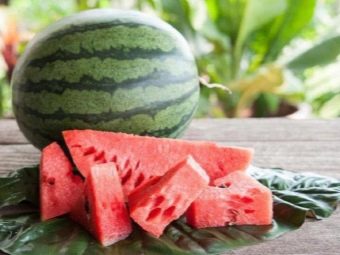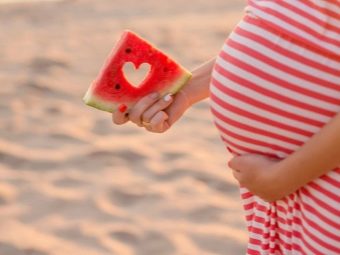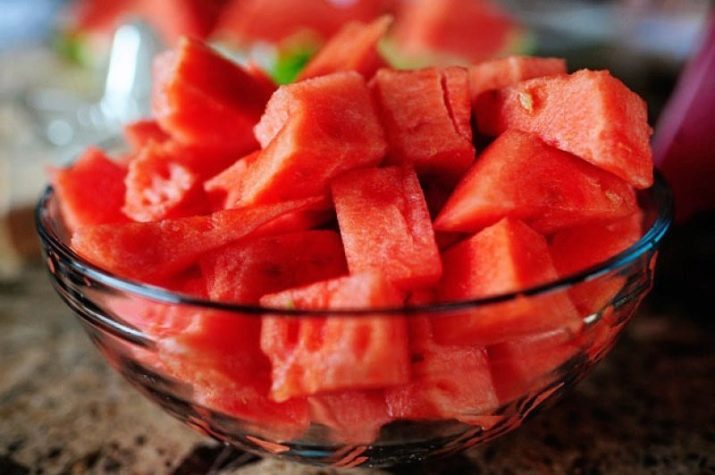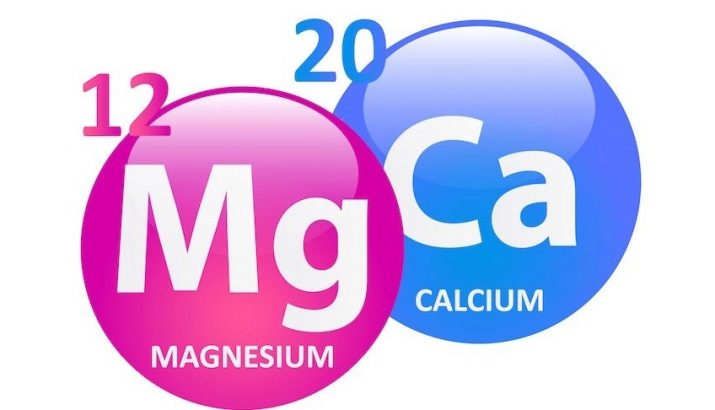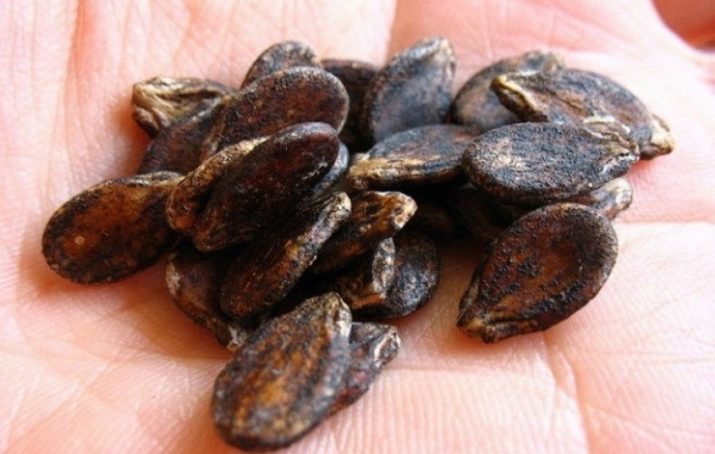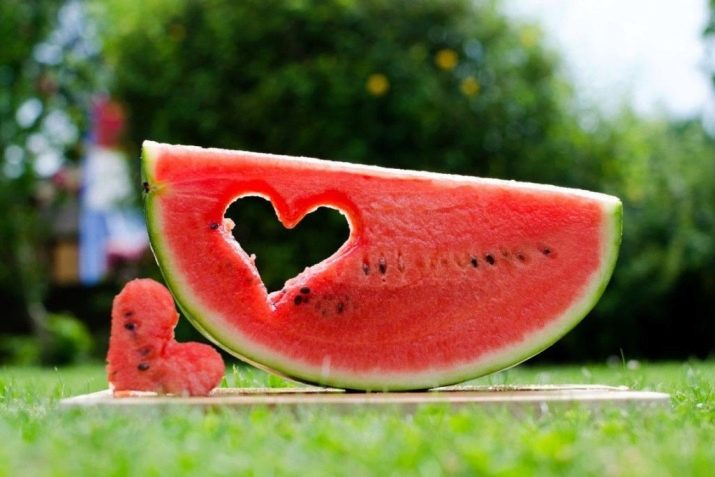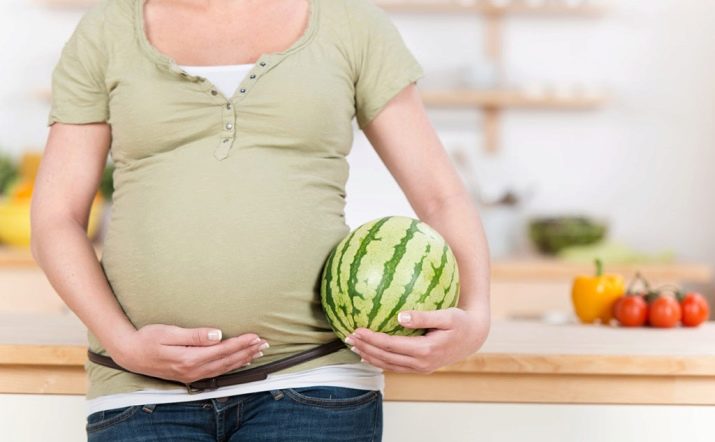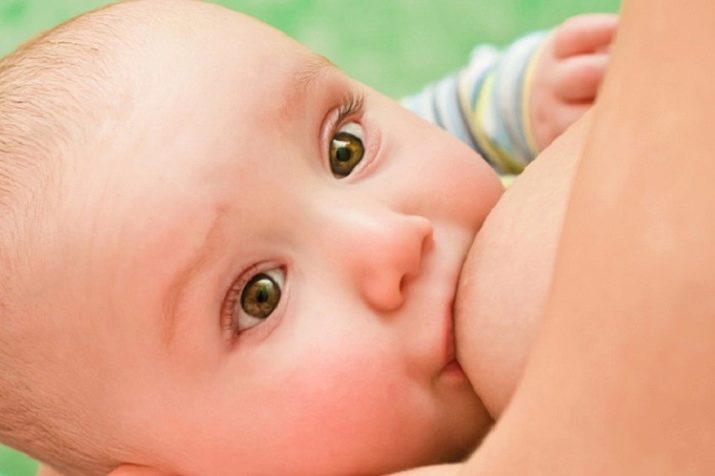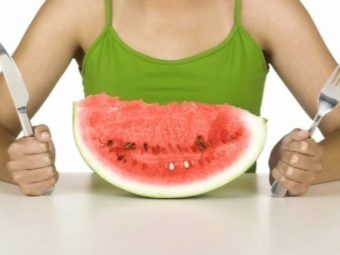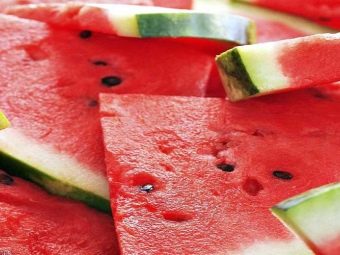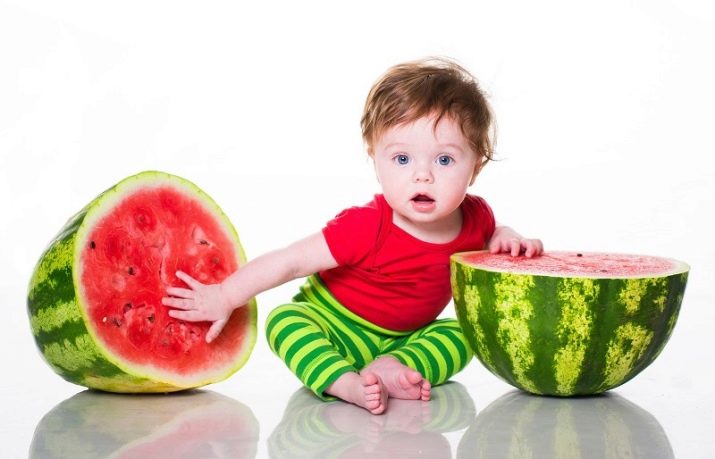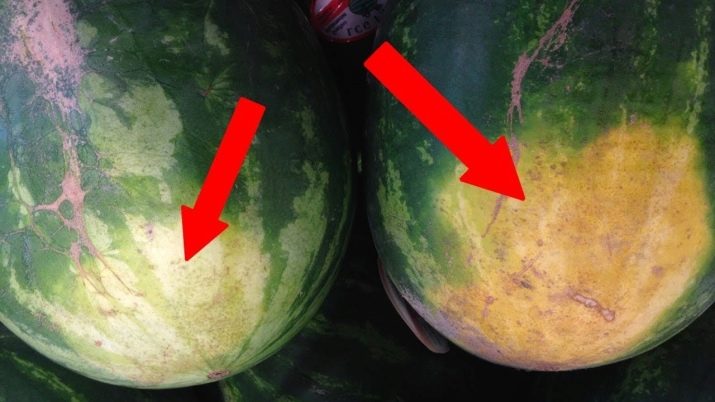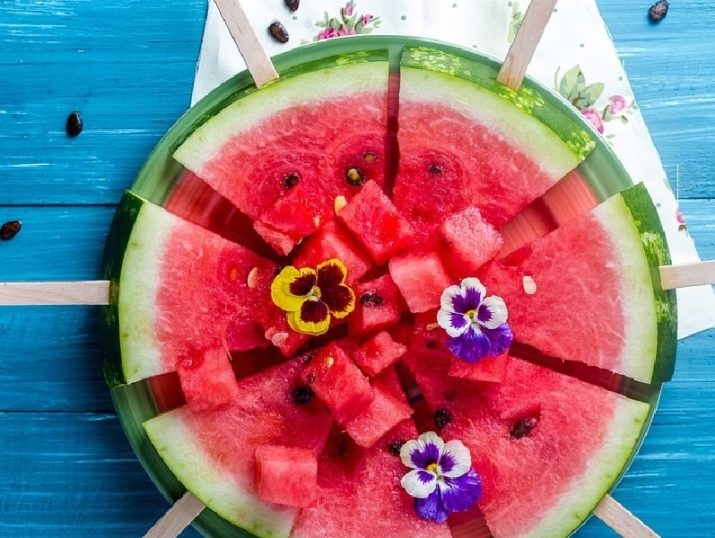Watermelon during pregnancy and breastfeeding - benefit or harm?
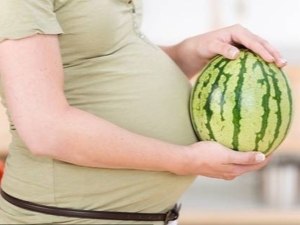
The end of summer — the beginning of autumn — the harvest season and an excellent opportunity to replenish the reserves of vitamins and trace elements in our own body.This is especially important for pregnant and lactating women, because during this period their bodies are under tremendous pressure. Is it possible to use watermelon in this category of women? This will tell our article.
What is useful?
Watermelon is 90% water, which is why for a long time it was believed that it does not carry much benefit to the body. However, this is not true, because in the dry residue it contains a sufficiently large amount of vitamins C, PP, B, A. It contains sugars, fiber, and potassium salts.
Despite the sweetness watermelon is considered a low-calorie product, since its nutritional value is 28-32 kcal / 100 g. During pregnancy, there is often a need for increased consumption of a particular product and sweets are no exception. It is watermelon that can replace high carbohydrate fruits, as well as less useful sweets and cakes.
Drinking watermelon allows you to fill the body's need for ascorbic acid. Since this gourd culture is not subjected to heat treatment, the vitamin from it is absorbed in full.
Vitamin C is necessary for pregnant and lactating women as the main assistant in strengthening immunity. It is clear that during this period it is not only extremely undesirable for a woman, but in some cases it is dangerous to get sick.
Strong immunity will increase the body's resistance to infections, colds, and adverse environmental factors. Lack of "ascorbinka" becomes the cause of lethargy, drowsiness, depressed mood. It is also necessary for the formation of the skeleton of the fetus, to improve the absorption and retention of calcium in the body of a woman. The lack of the latter is a frequent occurrence in the period of carrying a child and breastfeeding.
Pyridoxine, known as vitamin B6, which is responsible for proper metabolic metabolism, is also found in large amounts in watermelon. Violation of metabolism provokes many diseases and problems with excess weight. In addition, pyridoxine removes excess fluid from the body, saving it from puffiness during pregnancy. Its benefit lies in the fact that it cleanses the body of toxins, so the consumption of watermelon helps to cope with toxemia. Yes, and its juiciness, and pleasant taste without closeness help to eliminate nausea attacks.
In addition to pyridoxine, other types of vitamins of this group are present in watermelon - riboflavin and thiamine, which are responsible for strengthening the nervous system, improving the transmission of nerve impulses. 100 g of watermelon contains 2% of the daily norm of folic acid, also known as vitamin B 9. It is especially important during pregnancy because it participates in the formation of the neural tube of the fetus, brain and spinal cord. However, with a vitamin deficiency with conception and carrying a child, difficulties are also possible.
During pregnancy, the cardiovascular system of a woman is under increased stress, so magnesium and calcium in the composition of the watermelon can be very helpful. They strengthen the heart, improve its conductivity, eliminate tachycardia.
Due to the peculiarities of the vitamin-mineral composition and a large amount of liquid, watermelons can gently lower the pressure during hypertension.
Vitamins C and E increase the elasticity of the vascular walls, cleanse the blood from "bad" cholesterol and demonstrate an antioxidant effect. This avoids stagnation of blood, helps to improve blood flow between the fetus and the mother.
Most of the vitamin E is contained in watermelon seeds, if they are thoroughly chewed and not abused, then it will be possible to supply the body with tocopherol, without harming it. The benefit of vitamin E, by the way, lies in the fact that it participates in the process of assimilating a number of other vitamins.
In addition, iron is present in the composition of the watermelon, the digestibility of which is significantly increased due to its proximity to ascorbic acid. Iron deficiency is signaled by a low level of hemoglobin, with a significant decrease in iron deficiency anemia.Such changes negatively affect the state of the mother - she experiences weakness, nausea, dizziness, the likelihood of sudden fainting is high.
But anemia is even more dangerous for the fetus, since in this case the child does not receive a sufficient portion of oxygen, which is fraught with congenital pathology, cord entanglement, hypoxia, miscarriage, premature birth and fetal death of the child.
Iron deficiency is often observed in women after childbirth, during lactation. Ancestral blood loss leads to a decrease in hemoglobin level. With a lack of iron in the diet of a nursing woman, the body begins to "get" it from its own reserves to give to breast milk. Not surprisingly, this also provokes anemia.
Returning to the properties of potassium and magnesium, it should be noted that the first allows you to withstand the water-salt balance in the body and contributes to the removal of excess water. This, in turn, relieves pressure from all organs, allows you to cope with the swelling. Magnesium removes muscle tone, helps to avoid uterine hypertonia. In addition, magnesium helps to maintain the strength of teeth and bones, and participates in the formation of the skeletal system of the fetus.
The diuretic effect, as well as the property of watermelons to eliminate toxins, have a positive effect on the health of the liver and kidneys. The presence of neutralizing alkalis in the berry makes watermelon useful for preventing diseases of the urogenital system, changes in pH level.
Watermelon seeds also have a pronounced antioxidant effect, and also help to excrete parasites from the body, in some cases save from helminthiasis. Despite the fact that the latter is considered a “childhood” disease, no one is immune from the appearance of helminths in the body. It is not easy to choose a harmless drug for a pregnant and lactating woman, but watermelon seeds do quite well in the role of an anthelmintic drug.
The presence of fiber allows you to talk about the soft laxative action of melons, and in fact constipation is often tormented both in the first and last trimester of pregnancy, and in the first months after birth.
Possible harm
- Contraindications to the use of watermelons is an individual intolerance to the product, an allergy to melons. Withdrawal of the product should be with increased acidity of gastric juice, acute gastritis, ulcers, because taking watermelon will cause a deterioration in the patient's condition. With a tendency to flatulence, watermelon should be eaten with caution so as not to cause even greater swelling and gas formation.
- With serious violations in the activity of the kidneys, as well as the presence of stones and sand in them, the watermelon is contraindicated in the bladder, because it can cause their movement, which is dangerous for health and may require surgical intervention.
- For obesity and diabetes, the possibility of using watermelon and the permitted dosage should be determined by the doctor.
- It is important to choose the right watermelons. Too early, like watermelons in the off-season, contain large amounts of nitrates. It is impossible to predict the reaction of the organism to such a “treat”, especially if we are talking about a pregnant or nursing woman. As you know, during this period, there are significant hormonal changes. In addition, the nitrate product may cause increased uterine contraction, which is dangerous for the mother and fetus.
- It is undesirable to buy incised watermelons, halves, as well as those whose surface is damaged. Even a small incision penetrates the bacteria, which actively proliferate in a beneficial environment. Eating such watermelon is fraught with diarrhea, abdominal pain and a more serious intestinal infection.
When breastfeeding use of watermelon is not prohibited, unless it causes deterioration of the child's condition.
Terms of Use
- It is better to single out a separate meal for watermelon delicacy, it should not be used as a dessert.You can combine it with bread (some of them are very pleasant to the taste like a tandem), but only with white. Rye will cause fermentation in the intestines and gas formation. But to combine striped berry with milk and dairy products is impossible in any case.
- The daily dosage of the product ranges from 200 to 700 g, depending on the condition of the woman, the duration of pregnancy. Consume it should be in the morning or afternoon hours. Evening tasting is fraught with stress on the kidneys and bladder, and will also cause morning edema.
- You do not need to devour the pulp to cover, eat the white part. The crust should remain with a small (3-4 cm) layer of white and reddish pulp on top.
- It is important to eat fresh fruit. It is better to eat sliced watermelon immediately, the maximum shelf life in the refrigerator is 24 hours. That is why you should not buy already sliced product, you do not know how long it is in a similar state.
- In the first month of pregnancy, in the absence of complications and contraindications, you can afford a lot of watermelon, especially since its juice does an excellent job with morning toxemia. In the 3rd trimester, when the enlarged uterus is pressing on the bladder, you should not get carried away with berries, because this will cause frequent urination, will cause puffiness.
- If you are prone to diarrhea, you should not eat watermelons in large quantities, especially in the last months of gestation. Due to the presence of fiber in them, there is an increase in intestinal motility, which may accidentally also provoke a contraction of the uterus.
- If, being on HB, you decide to include a watermelon in your diet, it should be done in small portions. It is not necessary to include several new products at once, since, firstly, this will stress the body of the infant, and secondly, when a negative reaction appears, it will be difficult to find out which of the products the body has reacted to.
- After the first portion eaten, you should wait a day, observing the condition of the crumbs, in the absence of allergic reactions, you can gradually increase the daily dosage to 3-4 pieces. Since watermelon can cause increased gas formation and colic in infants, mom should not include it in the diet until the child is 2–3 months old.
- Speaking about the use of watermelon during lactation, one should focus on the state of not only the baby, but also the mother. Contraindications to taking the berries (which is the watermelon) apply to both pregnant and nursing.
- Finally, it is worth noting that due to the large amount of water in the composition of the watermelon, its use can cause a change in taste and concentration of breast milk, which is unlikely to please the baby. Milk will become more liquid, will not give feelings of saturation.
Recommendations
It is important not only to use a watermelon, but also to choose it.
- It is recommended to choose a product that is not too large, but not small. It is optimal if its weight is 5-7 kg.
- Ideal if watermelon is grown in natural conditions. One of the signs of naturalness is a dry spot on the side, palm-sized or slightly smaller. This indicates a long stay of watermelon in the sun, growing on melon up to technical maturity. The beginning of the watermelon season is at the end of August, only by this time the watermelons ripen naturally.
- Purchased fruit can also be checked for the presence of nitrates. To do this, a piece of pulp should be dipped in a glass of hot water. If the watermelon began to dissolve (fall apart) in the water, and the water became turbid - the composition is natural, the staining of the water in a pink or red hue is evidence of the presence of nitrates.
- If you bought a watermelon, then do not rush, being pregnant or nursing, immediately start tasting. Let the other members of the family do it, and after 3-4 hours, in the absence of unpleasant, even if only a few symptoms, you can eat your portion.
- If the watermelon bought during the cut shows uneven color and has a more saturated color of the flesh closer to the crust, this indicates that the fruit was “ripened” already in the window by injection. Even if it has a pleasant taste and does not cause concern to the rest of the household, women on GW and in the "interesting position" should not be used.
- To determine the presence of chemistry in the composition and help assess the pulp. If it is smooth and even, this indicates the presence of foreign components in the composition. Natural fruit has a slightly grainy flesh.
About the benefits of watermelon, see the following video.

